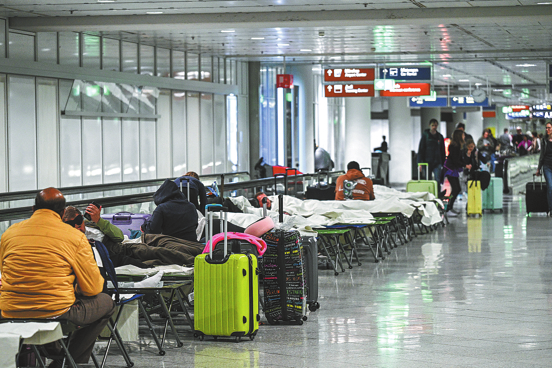Variant deepens mental strains felt on US campuses


The COVID-19 pandemic has triggered a mental health crisis on US campuses and the inroads made by the Omicron variant across the country are ratcheting up the levels as many colleges switch back to remote classes.
One such college is Brandeis University in Boston. When a student there who gave his name as Jonathan learned of the move, his heart sank. The university is putting all classes online for at least the first two weeks of the new semester.
"I would rather face the risk of the Omicron variant than facing the isolation again taking online classes," Jonathan, an international student from China, told China Daily by phone. "The quality of education deteriorates with online learning, and it's horrible to be unable to gather when a lot of us are still low in spirit."
For Jonathan, moving back to online classes reminds him of the fall semester of 2020 - "the darkest time" of his life.
When Jonathan went back to Brandeis after spending the 2020 summer near a friend's family in the US, he found that it was mostly international students who were on campus. Most of the US students stayed home for remote instruction.
He often encountered no one at the six-story dormitory. There was no social life, nobody to talk to. To fend off the spread of the coronavirus, everyone was assigned a unit of their own with no roommate.
"I relied on phoning home often to dispel the feeling of isolation and loneliness. I developed social anxiety - I felt fearful when I went to supermarket and saw crowds of people. I barely made it through the semester."
He found it necessary to take a gap semester in the spring of 2021 and went home to recover.
Jonathan said he gradually reduced his social anxiety after he got back to in-person learning for the 2021 fall semester.
"However, as the semester went on, I noticed that some students, the number being more than usual, became absent due to illness, simply dropped the class, or requested extensions. People seemed easily to succumb to even minor challenges," Jonathan said.
He doesn't think he's clinically depressed, but he is low in spirit.
Jonathan is not alone in worrying about his mental health as many universities cancel in-person classes due to the Omicron variant.
According to a study by the Center for Collegiate Mental Health at Pennsylvania State University, most students have suffered mentally.
The study reviewed data on 43,098 college students who sought treatment in the fall of 2020 at 137 counseling centers. While 72 percent said the pandemic had harmed their mental health, only 26 percent of students were concerned about the threat to their physical health from COVID-19.
Laura Saunders, clinical coordinator for Young Adult Services at Connecticut's Hartford HealthCare, said COVID-19 surges have wreaked havoc on the ability of young people to learn, and the ripple effects can't be underestimated.
"All those gaps in knowledge can cause increased anxiety due to uncertainty as grade level expectations in school were mounting," Saunders said in a newsletter in December.
Widespread mental stress from COVID-19 on college campuses has become an epidemic within the pandemic. Some of the more vulnerable students committed suicide.
At Dartmouth College, three first-year students have died by suicide since November 2020. The University of North Carolina at Chapel Hill reported two suicide deaths and an attempted suicide in the fall semester.

































